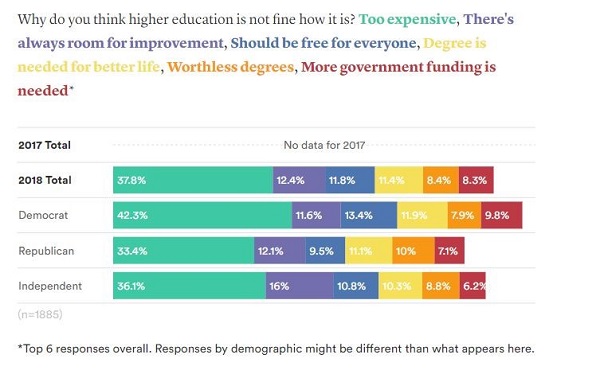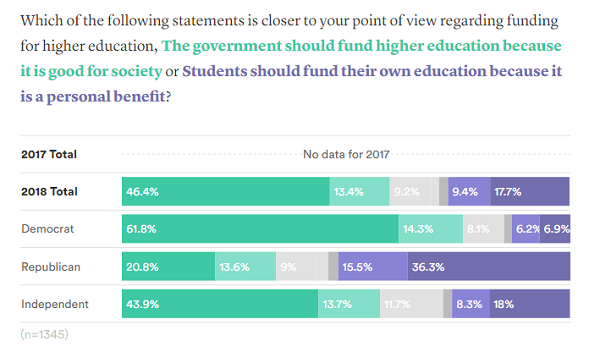Among Americans, There’s a Mixed Attitudes Toward College
Last summer I reported on a Pew Research survey that found only 36 percent of Republicans thought colleges had a positive effect on the country. Among Democrats, support was twice as strong (72 percent). I wrote a follow-up piece trying to understand why Americans were losing faith in college — and suggesting it was an over-reaction.
A few days ago New America came out with its second annual survey on Americans’ attitudes towards college. They found good and bad news for colleges. They also found areas of agreement and disagreement among Republicans and Democrats.
We Think Education After High School is Best
Four out of five respondents believe there are more opportunities for those who pursue education after high school. Just 14 percent say it’s better to go straight to the work force. But only 52 percent of respondents believe well-paying jobs require education after high school. Half is a lot less than four out of five. Why is there such a large difference?
It could be that folks are counting workforce-based programs as “education.” Nine in ten (90 percent) believe that apprenticeships and skills training programs equip people to earn a good standard of living. So huge support there.
Another possible explanation is that if you look at the Bureau of Labor Statistics, there are lots of jobs that don’t “require” a degree beyond high school. But in practice, many employers in “non-college” lines of work screen out applicants who lack a degree. Critics refer to this as degree inflation.
If you know people who earned a degree, and who are currently underemployed — doing a job that doesn’t require a degree — that’s what we’re talking about. Maybe you’re thinking, “Yes, but they wouldn’t even have that job without their degree.” That’s probably why only 14 percent say it’s better to go straight into the work force after high school. That doesn’t mean we think it should be that way, but rather, that it is that way.
We Think Some Colleges Are Worth the Cost
About four out of five people said that community colleges are worth the cost. Republicans and Democrats are equally positive on that one. It dropped off from there: Overall, 65 percent said that four-year public schools were worth the cost. While there was a 10 percent partisan split between Democrats (69 percent) and Republicans (59 percent), even 59 percent represents a strong majority.
Not so in the realm of private colleges and universities. Only 44 percent said they were worth the cost. There was a 13 percent split between Democrats (49 percent) and Republicans (36 percent) — neither party mustering a majority support. How about the for-profits? They’ve fallen on hard times. Republicans were slightly more supportive than Democrats (43 percent vs. 40 percent), but this is clearly the least loved sector.
In a sense, these results are not surprising: The greater the out-of-pocket cost to the individual student or family, the less Americans are inclined to see the particular college as being “worth the cost.”
We Love Our Local Colleges
About four out of five people support their local colleges and universities. Support was fairly even between Republicans (78 percent) and Democrats (84 percent). But there was similar bipartisan support on the need for change: Only 24.2 percent of Republicans and 24.4 percent of Democrats think “higher education in America is fine how it is.”
What’s wrong with higher education? The top response was too expensive. There were some partisan differences in ways you might have expected.
It’s interesting that most people like their local colleges but have concerns with higher education on the whole. Rachel Fishman, deputy director for higher education research at New America, compared this to people “hating Congress” but loving their Congressperson. Journalist Paul Fain notes that this is similar to something Inside Higher Ed has observed in their surveys with campus administrators. Executives tend to see financial health, promise, and opportunity on their campus but problems within the higher education industry as a whole.
We Disagree on Who Should Pay for College, and Why
The New America survey also revealed a key division between Democrats and Republicans. Who should pay for college? And why? About 76 percent of Democrats think the government should pay for college because it’s good for society. But 52 percent of Republicans think that students should pay for college because they benefit as individuals.
About 64 percent of Republicans are comfortable with their tax dollars supporting higher education. In fact, 57 percent of Republicans said that states should spend more in this area, while 54 percent said the federal government should spend more. This is arguably consistent with the response that college is “too expensive.” But it might also be that folks don’t realize how much is already subsidized.
Our two main parties both have large followings. As a result, the higher education system we have now, as Preston Cooper writes, where students pay tuition but a variety of government subsidies exist, is about what you’d expect.
Dr. Alex Chediak (Ph.D., U.C. Berkeley) is a professor and the author of Thriving at College (Tyndale House, 2011), a roadmap for how students can best navigate the challenges of their college years. His latest book is Beating the College Debt Trap. Learn more about him at www.alexchediak.com or follow him on Twitter (@chediak).




